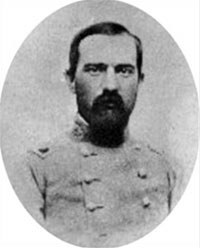
William Dorsey Pender (1834-1863)
William Dorsey Pender was born on February 6, 1834, in Edgecomb City, North Carolina. Pender entered West Point in 1850 at age 16. He graduated in 1854, ranked 19th out of 46 in his class. Amongst his distinguished classmates were G. W. C Lee, O. O. Howard, John Pegram, Jeb Stuart, Archibald Gracie, S. D. Lee, Stephen H. Weed, James Deshler, and Thomas H. Ruger. The class of 1854 produced 11 generals; of these 11, 6 were killed in battle, including five for the Confederacy. Upon graduation Pender was commissioned in the Artillery.
He went to serve with the 1st U.S. Dragoons, mostly on the Pacific Coast. In the antebellum army, the dark-haired, strong Pender was known for his bravery as a lieutenant in the dragoons. Faced with an Indian chief at the battle of Spokane Plains in the Washington Territory, Pender turned the battle by galloping up to the chief, grabbing him by the arm and throat, and carrying him in that fashion away from his braves. Pender then took him back to his line and hurled the chief into the midst of his troopers.
Pender resigned his U.S. Army commission on March 21, 1861 to join the Confederacy. He was one of the first Southerners to join the Confederacy. He became a colonel with the the 3rd and 6th North Carolina Infantry regiments, quickly gained a reputation as a hard-hitting commander, and was thought of as one of the best fighting generals in the Army of Northern Virginia.
On June 3, 1862, he was promoted to brigadier general after a fine performance at Seven Pines and assigned to command a North Carolina brigade in A.P. Hill's "Light Division." Pender's bravery was so conspicuous at that battle as to attract the attention of Jefferson Davis, who said: "General Pender, I salute you." Davis had Pender promoted on the battlefield to general.
Pender distinguished himself as a brigade commander. An admirer of Hood, he strove to make his brigade "second to none by Hood's Texas boys." Wounded at Malvern Hill during the Seven Days, he was back with his men to fight at Cedar Mountain, Second Manassas, Harper's Ferry, and Sharpsburg. He was wounded at both Fredericksburg and Chancellorsville as well as at Second Manaassas where after a shellt grazed his head he jokingly told his wife that he was well but his head was a "little more bald of yore."
Upon reorganization of the army, he was given command of the division upon A.P. Hill's promotion to command of the Third Corps. With this increased responsibility came a promotion to major general on May 27, 1863.
A favorite of A.P. Hill, he was hand-picked by Hill to command the old Light Division when Hill was promoted. Hill wrote of Pender: "Gen. Pender has fought with the Division in every battle, has been four times wounded and never left the field, has risen by death and wounds from fifth brigadier to be its senior, has the best drilled and disciplined Brigade in the Division, and more than all, possesses the unbounded confidence of the Division."
One officer sums them up, stating the opinion of most who knew him: "He was one of the coolest, most self-possessed and one of the most absolutely fearless men under fire I ever knew."
Pender was married and had two sons. At twenty-nine, he was one of the youngest of Lee's division commanders. He wore a pair of black stars cut from felt sewn on the collar of a rough gray tunic to indicate rank.
Pender could be blunt. He had an argument with James Jay Archer around the time of Fredericksburg and was no fan of Jackson or Stuart. Of the former, Pender remarked that he only wished for promotion as "a means of getting out of Jackson's command." He noted that Jackson would "kill up the army the way he marches" and that Jackson was too forgetful of the fact "that one gets tired, hungry, or sleepy." As to the latter, Pender thought his classmate "a scheming fellow" who he would "not have him command the corps for anything in the world." He also felt that there was Virginia bias in the Army, noting that he had two strikes against him—he was from North Carolina ("and that will work against me with Mr. Davis") and he was a friend of General Hill which he felt would work against him with Jackson.
Pender led the Light Division at Gettysburg. While trying to ready his troops on the 2nd day of fighting, Pender was wounded in the fleshy part of the thigh by a shell fragment. The wound bled profousely. The sight probably did not alarm his men, who were used to seeing Pender wounded before. Reluctantly Pender had to go to the rear. Deemed too valuable to be left behind to be captured, Pender was jostled back across the Potomac in a wagon. Despite the difficult ride and an infection setting in it was thought that he would recover, however, as his condition seemed to be improving. He then suffered a severe bleeding at Staunton, Virginia and while he was able to stop the blood with a hairbrush and towel as a tourniquet, the surgeon deemed the artery impossible to repair and the leg was amputated. Pender died within a few hours after the operation on July 18, 1863.
He was buried in the churchyard of Calvary Church in Tarboro, North Carolina. His last words were "Tell my wife that I do not fear to die. I can confidently resign my soul to God, trusting in the atonement of Jesus Christ. My only regret is to leave her and our two children. I have always tried to do my duty in every sphere in which Providence has placed me."